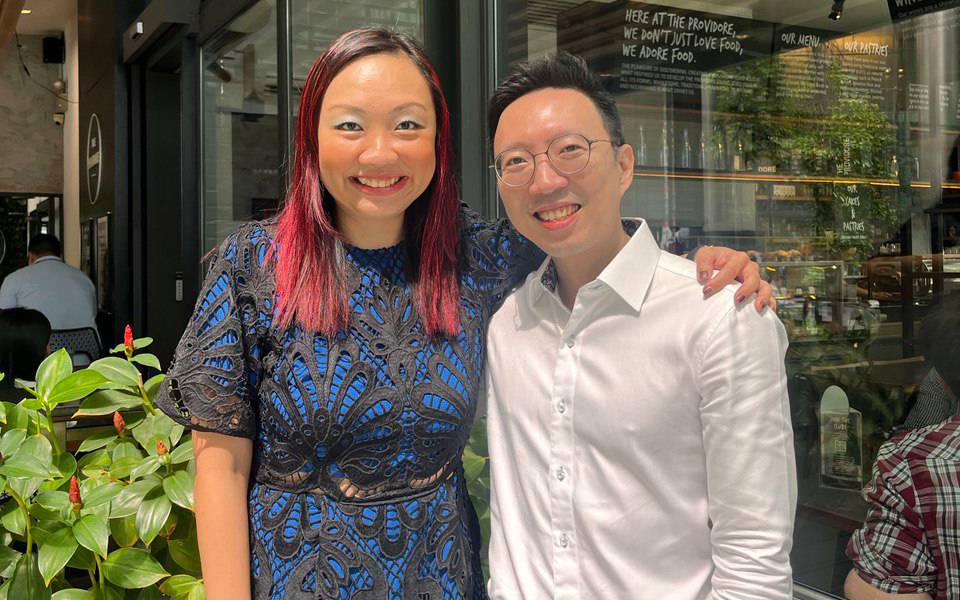FROM BRIEFS TO BRILLIANCE: PAUL TAN AND LYNETTE KOH
How an attachment in London has helped both members learn, network and become better lawyers.

BY ASHUTOSH RAVIKRISHNAN
Today, Mr Paul Tan and Ms Lynette Koh are leaders in their respective fields. Paul is an expert arbitration practitioner who heads the Asian arbitration practice from the Singapore office of Gibson, Dunn & Crutcher. He has also written extensively about commercial arbitration, including in last year’s Academy Publishing title, The Law and Theory of International Commercial Arbitration in Singapore.
Meanwhile, Lynette recently returned to private practice as a director at Helmsman LLC, where she heads the Corporate, Banking and Finance practice. This follows a successful in-house career, where she was Head of Legal of a Japanese bank covering Singapore and the region. Private practice is familiar territory for her—before her time in house, she chalked up more than 10 years of experience as a litigator specialising in banking and financing disputes, corporate insolvencies and debt restructuring.
Given their positions today, it’s no surprise that Paul and Lynette are both well-versed in international work. No doubt, this comes from their years of handling cross-border matters—but their success can also be traced back to a valuable stint they shared in London in 2011.
That year, SAL spearheaded an overseas attachment programme to hone its members’ international skills, and Paul and Lynette were its first recipients. They were attached to leading barristers’ chambers Essex Court Chambers and Fountain Court Chambers, where they worked closely with King’s Counsel (KC). Today, SAL members continue to enjoy a similar experience through the Christopher Bathurst Prize and the ECC-SAL International Mooting Competition.
“A decade ago, we had even fewer SCs in Singapore, so it was a significant opportunity to work under a KC,” Lynette explains. “We picked up the ethos of how they think and approach a legal problem; we then brought that back and integrated it into our own thought processes.”
Lynette was able to absorb so much thanks to the attachment’s emphasis on learning. “As a law school intern, I remember being given a task to do and a partner would check in on us every now and then. But in this attachment, we were breathing the same air as these legal bigwigs, getting a front-row seat to how they worked and thought. It was invaluable.”
The experience of working with KCs also left a deep impression on Paul. “Being with KCs, I also got to see a variety of advocacy styles and internalise the ones that most suited my personality and the kind of work I do. Watching star advocates was part of a constitutive process that eventually helped me become a better advocate.”
EYE-OPENERS
In addition to advocacy styles, the attachment also offered deep dives into their respective areas of interest. Paul went to London already mulling a career in arbitration. “And because I was working with people like Toby Landau KC, Joe Smouha KC, Jern-Fei Ng KC and Professor Dan Sarooshi KC (who was also my Oxford tutor), I got to work on commercial arbitrations, investor-state arbitrations, WTO disputes and even some public international law cases. That was a real eye-opener. It was the first time I was working on those sorts of things and looking back, it was a steep learning curve. But it gave me a headstart over my peers, because those kinds of cases had not come to Singapore just yet.”
Lynette shares a similar perspective. “At the time that I went, a lot of global wealth was concentrated in the West. During my attachment, I was exposed to complex banking structures that were prevalent there, but that I had never seen before—even though I had been practising for 10 years! So when the tide turned and money started flowing to Asia, there was an expectation to emulate these structures here and I was at ease handling it, thanks to my experience there.”
Their stint in London also gifted Paul and Lynette with a strong network of practitioners and contemporaries. “So if we ever need a connection in London, we can approach those we worked for and others we got to know,” says Paul. “Those professional networks have definitely paid dividends—we now have an opportunity to instruct each other. And there’s a personal warmth as well. When these barristers are in town, for example, we make it a point to meet and have a meal. You can learn so many things about work and the law just from hearing what people are up to. That’s very satisfying.”
Perhaps that’s why, as leaders and managers now, they advocate for their mentees to gain international exposure, be it through internal rotations or the prizes offered by SAL. To those readying themselves for such an adventure, Lynette has this to say: “If you do get a chance to go, think about what you want to achieve. It’s not just about having a good time, although that's definitely on the cards!”
The ECC-SAL International Mooting Competition, co-organised by the members of Essex Court Chambers (ECC) and SAL, presents an ideal opportunity for young lawyers around the world to showcase and hone their skills as advocates. The winning team will be offered an all-expenses paid two-week internship at Essex Court Chambers in London. Applications close 1 November 2023. More details here.






